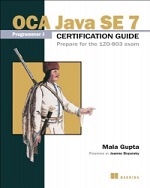OCA Java SE 7 Programmer I Certification Guide
Marc Rufer 04 Apr 2015 Java development book reader-experience
As recommended to prepare for the Java SE7 associate programmer certification I read the certification guide written by Mala Gupta. In this post I would like to go into the most interesting things treated by this book.

General Impression
In my opinion reading this book wasn’t very hard because the author did a very good job. The book is structured logically and goes from basics to more complex topics. Additionally the author tried to work with graphical representations for easier understanding. Last but not least every chapter has a question section where you can verify if you understood the stuff treated in the corresponding chapter.
Most interesting things
Now, as announced I’ll go through some of the most interesting things I learned from this book. The selection of “most interesting things” is a personal and subjective selection.
String Pool
The explanations about the String pool was a welcome refresher. The Java String pool is managed by the JVM and holds a couple of String objects, which could be referenced by several String variables. If a String value is assigned to a String variable without instantiating a new String object, a new String object will be created in the String pool if the value doesn’t already exist and then the reference will be assigned to the String variable.
// Assigning a String value to a String variable results in referencing
// and if not yet existing as well in creation of a String object in the pool
String s = "abc";
// Creating a new String object (Not in pool)
String s2 = new String("abc");
If the two Strings will be compared with == the result is false because not both variables are pointing to the object, which holds abc of the pool. If there will be a another variable (s3) initialized like s comparison of s3 and s by == will result in true because both variables are referencing the same object in the String pool.
StringBuilder vs. StringBuffer
For String manipulations like concatenation, insertion,… the fluent APIs of StringBuilder and StringBuffer are very helpful. The main difference between the two builder classes every Java developer should know is, that StringBuilder in contradiction to StringBuffer is not thread save. So if working with multi-thread applications you should always use StringBuffer instead of StringBuilder.
Arrays
Concerning arrays the book provides a lot of information. The most important thing to know about arrays from my point of view is the fact, that every array is an object. As well in the case if it only holds primitive types like int, long,…
Another interesting thing about arrays is, that declaration can be done in different ways as you can see below.
int[] array;
int array[];
int[][] towDimensionalArray;
int[] towDimensionalArray[];
int towDimensionalArray[][];
Polymorphism
The book also treats the topic polymorphism. I grabbed one special thing out of this topic, which is very important to know if working with Java.
Assume there is a class-hierarchy as follows

Let’s now have a look what happens, if the following code will be executed:
Employee employee = new FullTimeEmployee();
employee.calculateSalary();
String employeeName = employee.name;
employee.calculateSalary() will execute the calculateSalary-method of FullTimeEmployee because method invocation in Java is resolved by instance type. If accessing instance variables it’s the other way around, so employee.name will return the value of the instance variable of the super class as well, if the object of the subclass (in this case FullTimeEmployee) provides as well an instance variable called name.
Try with resources
Last but not least the exam preparation guide learnt me something about try-blocks I didn’t know before. Since Java 7 there is a possibility to declare resources directly in the try-statement. The advantage of that way of declaration is, that the JVM automatically handles the closing of such resources. The only condition is, that such a resource has to implement the AutoCloseable-interface.
Below a short example
try (BufferedReader br = new BufferedReader(new FileReader(path))) {
return br.readLine();
}
For more details have a look at the Java documentation
Recommendation
If you would like to take the exam as well I would recommend you to split your preparation into two steps. First reading the book from Mala Gupta, which covers all the topics of the certification exam. And secondly do some training exams. There are several providers of such training exams. One I could recommend you is Enthuware.